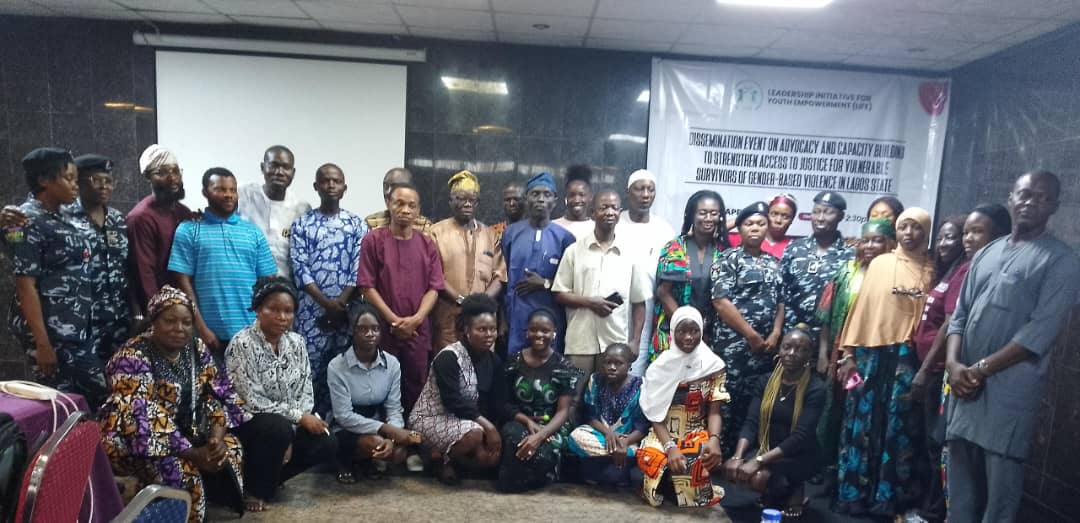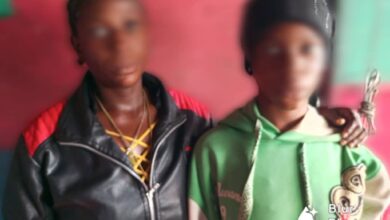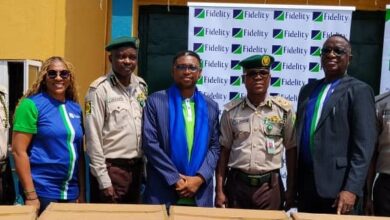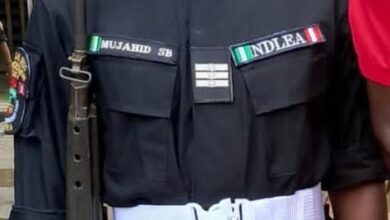Advocacy and Capacity Building: LIFE rounds up 18-month project on strengthening access to justice for vulnerable survivors of GBV in Lagos State
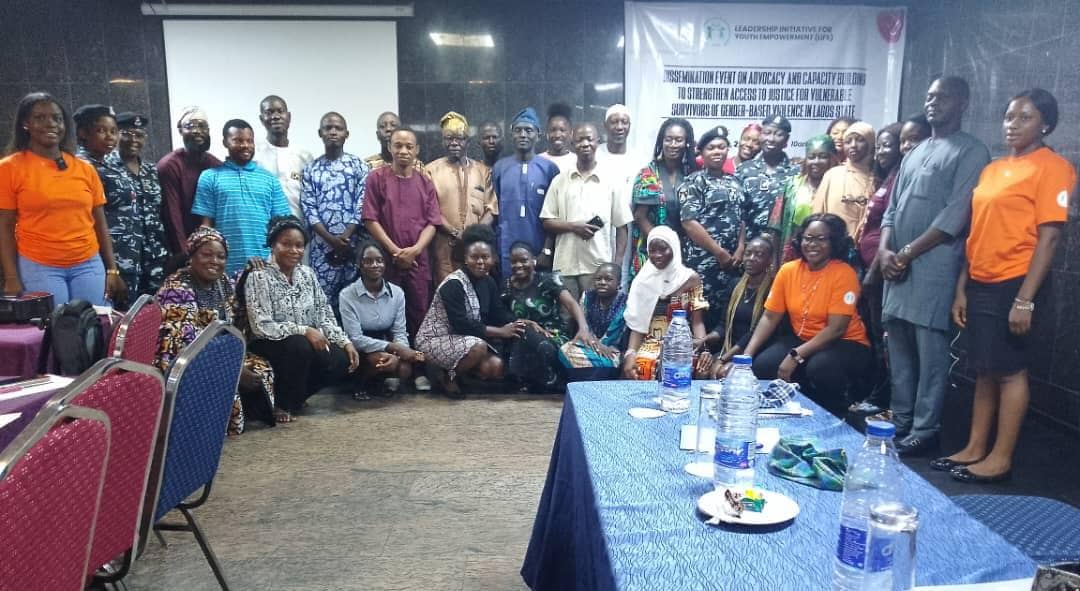
Advocacy and Capacity Building: LIFE rounds up 18-month project on strengthening access to justice for vulnerable survivors of GBV in Lagos State
By Naomi Onome
During a dissemination event held in Lagos on Friday, April 11, 2025, with partners and stakeholders present, Leadership Initiative for Youth Empowerment (LIFE) concluded its 18-month project on advocacy and capacity building to improve access to justice for vulnerable survivors of gender-based violence.
At the event, LIFE program officer Oluwatoyin Mokwe explained that the area of sensitization and capacity building on GBV centered on self-actualization of the youth, the girl child, and other concerning situations involving the girl child. In review of cases of vulnerable survivors over the years, LIFE has worked on situations arising from GBV and street sex, worked with different street sex organizations, sensitized people on the causes and effects of HIV and AIDS, and others. …
Currently, LIFE, she says, is implementing and gradually concluding three projects; two of these projects are on gender-based violence. The GBV implementation over the years has attracted sensitization of people from the grassroots, which includes communities, religious homes, and schools. Moreover, LIFE has rescued people suffering from drug abuse, arrested perpetrators of GBV, and provided psychosocial support for survivors traumatized by domestic violence.
Oluwatoyin told stakeholders at the event that the act of reporting a GBV situation in the community is a wake-up call for all. As much as sensitization is increasingly reaching the nooks and crannies of the society, it is still the social responsibility of inhabitants to report a violent act. She acknowledged some people do not have access to this information; hence, the need for continuous sensitization to awaken the minds of people. Moreover, the lack of the right information has kept many persons in ignorance of not being able to understand that GBV is a crime. She says, “It is our responsibility as individuals who already understand the concept of GBV to also sensitize other communities that we represent.”
The executive director of LIFE, Mrs. Abiodun Rufus-Unegbu, engages stakeholders on the lived experience of vulnerable persons of GBV. She said the project ‘GBV’ has been on for 18 months, and research has shown underreported cases while some are unaware of their rights to report cases of GBV. LIFE also realized that there is the issue of stigmatization of survivors and mandated reporters of sexual abuse cases from the home front, church/mosque, and palace of traditional rulers where these reports are tabled. The lack of adequate information on where to report such cases, like the police station or law court, has led survivors or families of these survivors to seek solutions using the aforementioned means, which can be detrimental to their image.
Abiodun itemized the key challenges identified by LIFE in the course of working with vulnerable persons, and they are
*Harassment and criticism of the victim by law enforcement officers.
*Limited knowledge and bias in law enforcement and the society at large (people do not know that there are laws against GBV, and some law enforcement officers are biased based on their religious or cultural beliefs).
*Fear and mistrust (a lot of people fail to report abuse cases due to fear of being judged or condemned, and also, if the perpetrators of the evil act are those trusted by the victims)
* Ineffective framework (a situation whereby it takes too long a time for judgment to be passed on perpetrators, and this can damage the victim emotionally).
Meanwhile, Abiodun says the systemic barriers involved in GBV cases include criminalization and inadequate legal protection; lack of inclusive and survivor-centered policies; weak enforcement and limited accountability; cultural stereotypes and social discrimination; and limited safe spaces for leadership and expression. For these reasons, LIFE is in collaboration with the Nigeria police and other sister agencies to create a safe space where people can have trust and believe in the justice system.
During the engagement, law enforcement officers in attendance addressed the laxity created by some other officers in cases of GBV. ASP Blessing, who is the OC Human Rights of Ijesha Division, said the attitude of an officer in addressing cases of GBV is not the representation of others. She said the Nigerian Police has upgraded its system of operation over the years and has established rules to address law enforcers who have conducted themselves wrongly while dispensing their duties; character and level of professionalism differ.
She added that
“For a rape case, the victims should not delay before reporting to the Mirabel Center, an NGO, or to the police to avoid tampered evidence; when evidence is presented, it takes the Mirabel Center a 72-hour window frame to produce results before the case can be taken up by the relevant authorities. The moment a victim takes his bath or delays reporting, the evidence will have been washed away, which makes it difficult to present the case.”
Mrs. Funke Daniel, the DCO of Okota Police Division, also dismissed claims of police officers making misguided utterances and being judgmental over victims of GBV, saying such conduct, if found, should be reported to the higher authority of that division or command for an immediate redress.
Dr. Ngozi Nwosu, in her project research for LIFE on vulnerable persons of GBV, said women are vulnerable due to the socio-cultural values against women in the society. However, the people with disabilities, the hermaphrodites (those who possess both male and female organs), and sex workers are mostly affected vulnerable persons of GBV. Also, according to research, in every five children, two are victims of domestic violence; GBV is said to affect more women than men, that is, women are more exposed to sexual harassment at their workplace, when seeking a job, by lecturers, others…
Speaking about the barriers in seeking justice for vulnerable survivors, Dr. Ngozi said denial of access to justice has remained a factor, stating that the perpetrators will approach victims with money as compensation to halt court proceedings.
She said,
“When a victim does not appear in court several times for a hearing, the court will automatically strike out the case. Another significant factor is oppression from perpetrators to instill fear in their victims as well as societal backlash. Some law enforcers also dismiss some domestic violence cases; they would rather advise victims to go and settle with their abusers.”
“In leadership, women are very few compared to their male counterparts, for they are the vulnerable ones in spite of Nigeria’s signed and ratified laws on women’s and peoples’ rights. Article 3 of that law says every individual has the right to equal protection by the law. At the national level, chapter 4 of the constitution of the Federal Republic of Nigeria on fundamental human rights guarantees the rights of all citizens irrespective of sex, place of birth, origin , religion, or political opinions, while article 5 entitles every individual to respect for their integrity and prohibits torture and other cruel, inhuman, and degrading treatment or punishment. In spite of the signed law, it is not fully implemented on the vulnerable women who have gone through abuses.”
“The VAPP Act (Violence Against Persons Prohibition Act) and African Charter on Human and People’s Rights that says we are all equal as signed by the Nigerian Government has been underutilized and non-implemented but still holds. During the war, the Police Anti-Torture Act was signed, which also shows that police have no right to torture anybody, and if approached, the citizens have a right to know why they are being apprehended.”
More findings reveal that many, when abused, do not know that there’s a law that exists to protect them. The lived experiences of vulnerable persons in Lagos State have shown various forms of violation identified as GBV, denial and poor access to justice , and a low percentage of vulnerable persons’ participation in leadership.”
Dr. Ngozi recommended that there should be establishments of laws, policies, and implementation of laws; the need to train more paralegals as a means of ending extortion and blackmail; the need for education, awareness, and knowledge; partnership with other mainstream organizations (advocates for rights); safety and security trainings and capacity building around resilience; and building knowledge around identities, multiple forms of abuse, and discrimination of other vulnerable persons such as sex workers and drug users.
The attendees of the LIFE workshop in groups presented a brief lowdown on the information gotten from the sensitization program in the last 18 months, which includes that when a victim is physically and sexually abused, the mandated reporter should:
*Identify the case.
* Seek consent of the victim.
*Report to the law enforcement agency.
* Involve third parties such as NGOs or human rights advocates to ensure victims get the right support and follow-up cases.
*Give moral and emotional support
* Reach them their rights.

